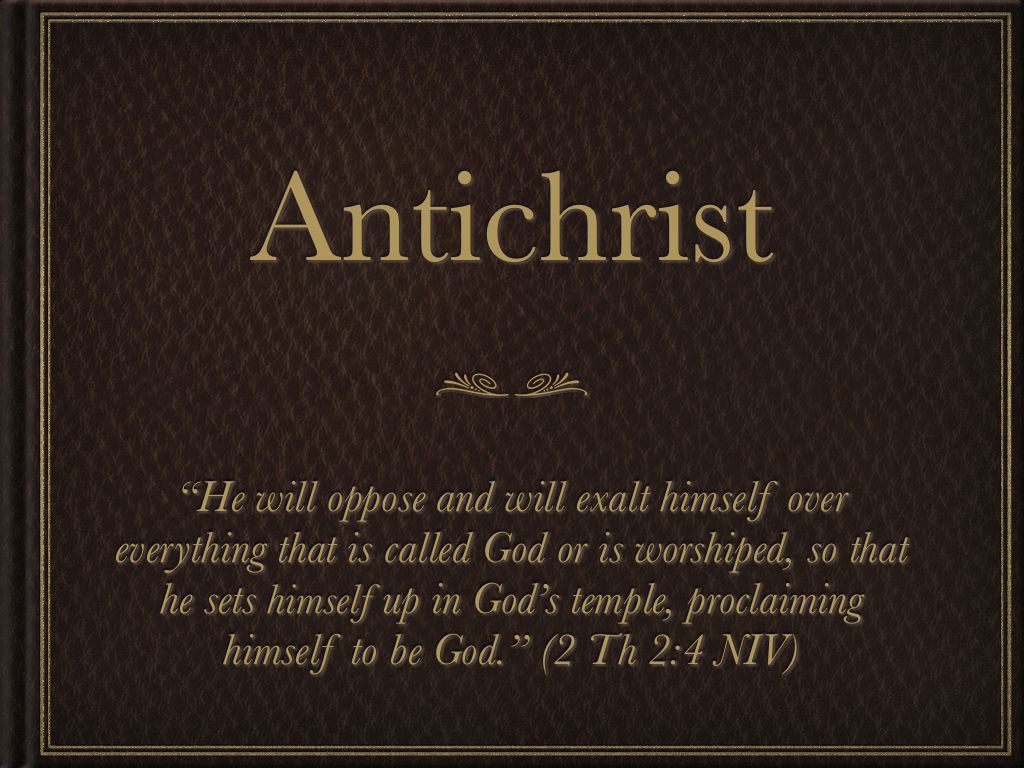The concept of the Antichrist has fascinated and intrigued people for centuries, sparking debates, discussions, and countless interpretations. As a central figure in religious prophecy, the Antichrist represents one of the most enigmatic and controversial topics in theology. Whether you're a scholar, a believer, or simply someone curious about the subject, understanding the origins, interpretations, and implications of the Antichrist can deepen your knowledge of religious texts and their significance in modern times.
The Antichrist is mentioned in various religious scriptures, particularly in Christianity, where it plays a significant role in eschatological teachings. Despite its widespread recognition, the concept remains shrouded in mystery, with differing interpretations across denominations and cultures. This article aims to shed light on the multifaceted nature of the Antichrist, exploring its historical roots, theological significance, and contemporary relevance.
By examining the Antichrist from multiple perspectives, we can gain a deeper understanding of its role in religious narratives and its potential impact on the world today. Whether you're interested in theology, history, or simply curious about the unknown, this guide will provide valuable insights into one of the most debated figures in religious prophecy.
Read also:Watch Ullu Web Series Online A Comprehensive Guide To Indias Hottest Streaming Platform
Table of Contents
- The Origin of the Antichrist
- Biblical Interpretation of the Antichrist
- Historical Perspective on the Antichrist
- Denominational Views on the Antichrist
- Symbols and Representations of the Antichrist
- The Antichrist in Modern Context
- Cultural Impact of the Antichrist
- Psychological Impact of the Antichrist
- Controversies Surrounding the Antichrist
- Conclusion: Understanding the Antichrist
The Origin of the Antichrist
The origins of the Antichrist can be traced back to early Christian writings, particularly in the New Testament. The term "Antichrist" appears in the letters of John, where it is used to describe individuals or forces that oppose Christ and his teachings. These early references laid the foundation for the development of the Antichrist concept in later theological discussions.
Early Christian Writings
In the First and Second Epistles of John, the Apostle John warns against false prophets and those who deny the divinity of Jesus Christ. These warnings were directed at specific groups or individuals who were seen as threats to the early Christian community. Over time, these warnings evolved into a broader concept of the Antichrist as a figure who would deceive and lead people astray.
According to scholars such as Dr. Bart Ehrman, the concept of the Antichrist was influenced by historical events and political tensions during the early Christian era. The persecution of Christians under Roman emperors like Nero and Domitian contributed to the development of apocalyptic themes in Christian literature, including the idea of a final enemy who would challenge Christ's authority.
Biblical Interpretation of the Antichrist
The Bible provides several references to the Antichrist, primarily in the New Testament. These references offer insights into the nature and role of the Antichrist in religious prophecy. By examining these passages, we can gain a better understanding of the theological significance of the Antichrist.
Key Biblical Passages
- 1 John 2:18-22: This passage introduces the concept of the Antichrist as a deceiver who denies Jesus Christ.
- 2 Thessalonians 2:1-12: Often referred to as the "man of lawlessness," this passage describes the Antichrist as a figure who will oppose and exalt himself above every so-called god or object of worship.
- Revelation 13: The Book of Revelation provides a detailed description of the Antichrist, often referred to as the "beast," and his role in the end times.
These passages have been interpreted in various ways by scholars and theologians, leading to differing views on the identity and characteristics of the Antichrist.
Historical Perspective on the Antichrist
Throughout history, the concept of the Antichrist has been shaped by cultural, political, and religious developments. From the early Christian era to the present day, interpretations of the Antichrist have evolved in response to changing societal conditions and theological debates.
Read also:Who Is Willa Fitzgeralds Husband A Comprehensive Guide To Her Love Life
Medieval Views
In medieval Europe, the Antichrist was often associated with political and religious figures who were seen as threats to the established order. The Catholic Church, for example, sometimes identified certain rulers or heretical movements as manifestations of the Antichrist. This period saw the emergence of elaborate depictions of the Antichrist in art and literature, reflecting the fears and anxieties of the time.
Historian Norman Cohn notes that the Antichrist legend played a significant role in shaping medieval apocalyptic thought, influencing everything from theological debates to popular culture.
Denominational Views on the Antichrist
Different Christian denominations have varying interpretations of the Antichrist, reflecting their distinct theological perspectives. These differences highlight the diversity of beliefs within Christianity and the ongoing debate over the nature of the Antichrist.
Protestant Perspective
Protestant theologians often emphasize the symbolic nature of the Antichrist, viewing it as a representation of forces that oppose Christ and his teachings. Reformers like Martin Luther and John Calvin interpreted the Antichrist in the context of their critiques of the Catholic Church, identifying certain practices and doctrines as antithetical to true Christianity.
Modern Protestant scholars continue to explore the Antichrist concept, often focusing on its relevance to contemporary issues such as religious persecution and moral decay.
Symbols and Representations of the Antichrist
The Antichrist has been depicted in various forms throughout history, using symbols and imagery to convey its significance. These representations reflect the cultural and religious contexts in which they were created, offering insights into the evolving understanding of the Antichrist.
Artistic Depictions
In medieval art, the Antichrist was often portrayed as a monstrous figure with animalistic features, symbolizing its opposition to divine order. These depictions served to reinforce the idea of the Antichrist as a force of evil and chaos. Modern interpretations, on the other hand, tend to focus on more abstract representations, emphasizing the Antichrist's role as a symbol of deception and falsehood.
Art historian E.H. Gombrich highlights the importance of symbolism in understanding the Antichrist, noting that these representations help to convey complex theological concepts in a visual form.
The Antichrist in Modern Context
In the modern world, the concept of the Antichrist continues to resonate with people, influencing everything from religious discourse to popular culture. As society grapples with issues such as globalization, technological advancement, and environmental challenges, the Antichrist serves as a reminder of the ongoing struggle between good and evil.
Contemporary Relevance
Today, the Antichrist is often discussed in the context of apocalyptic scenarios, with some religious leaders and scholars warning of its potential emergence in the near future. At the same time, the Antichrist remains a popular subject in literature, film, and other forms of media, reflecting its enduring appeal as a symbol of mystery and intrigue.
Sociologist Zygmunt Bauman argues that the Antichrist concept continues to hold relevance in the modern age, serving as a metaphor for the challenges and uncertainties facing humanity.
Cultural Impact of the Antichrist
The Antichrist has had a profound impact on culture, influencing everything from art and literature to music and film. Through these mediums, the Antichrist has been reimagined and reinterpreted, reflecting the changing values and concerns of society.
Influence on Popular Culture
From classic novels like John Milton's "Paradise Lost" to modern blockbusters such as "The Omen," the Antichrist has inspired countless works of art and entertainment. These creations often explore the psychological and moral dimensions of the Antichrist, inviting audiences to reflect on the nature of good and evil.
Cultural critic Susan Sontag notes that the Antichrist's presence in popular culture reflects a broader fascination with the unknown and the supernatural, highlighting humanity's enduring quest for meaning and understanding.
Psychological Impact of the Antichrist
The concept of the Antichrist can have a significant psychological impact on individuals, influencing their beliefs, values, and behaviors. For many, the Antichrist represents a source of fear and uncertainty, prompting questions about the nature of faith and the ultimate destiny of humanity.
Exploring Fear and Anxiety
Psychologists have studied the psychological effects of apocalyptic beliefs, including those related to the Antichrist. These studies reveal that such beliefs can both inspire and terrify, motivating individuals to seek meaning and purpose while also creating anxiety and stress.
Dr. Carol Tavris explains that the Antichrist concept taps into deep-seated fears about the unknown, offering a framework for understanding the complexities of human existence.
Controversies Surrounding the Antichrist
As with any religious or theological concept, the Antichrist has been the subject of numerous controversies and debates. These controversies often stem from differing interpretations of scripture, cultural biases, and political motivations.
Common Misconceptions
One of the most common misconceptions about the Antichrist is the belief that it refers to a single, identifiable individual. In reality, the Antichrist concept encompasses a wide range of interpretations, including symbolic and metaphorical understandings. Another controversy surrounds the identification of specific historical figures as the Antichrist, a practice that has often led to division and conflict within religious communities.
Religious scholar Elaine Pagels warns against the dangers of labeling individuals or groups as the Antichrist, emphasizing the importance of open dialogue and mutual understanding.
Conclusion: Understanding the Antichrist
In conclusion, the concept of the Antichrist remains one of the most fascinating and complex topics in religious prophecy. By examining its origins, interpretations, and cultural impact, we can gain a deeper appreciation for its significance in both historical and contemporary contexts. Whether viewed as a literal figure or a symbolic representation, the Antichrist continues to captivate and challenge those who seek to understand its meaning.
We invite you to share your thoughts and insights in the comments below, and to explore other articles on our site for further exploration of this intriguing subject. Together, we can deepen our understanding of the Antichrist and its role in shaping the world we live in today.


